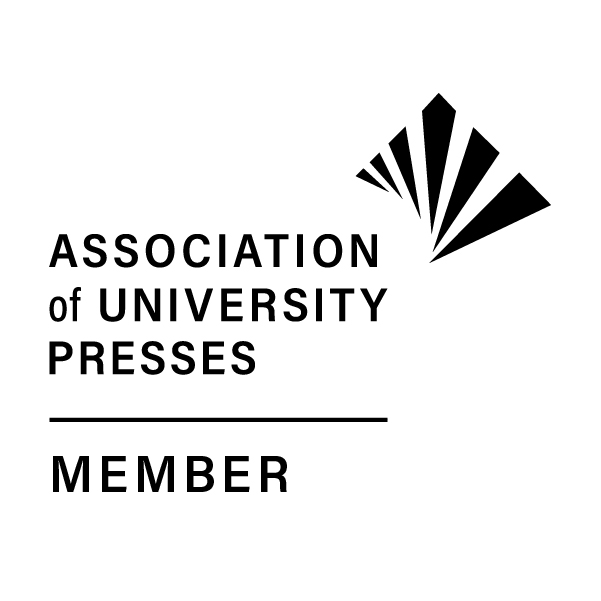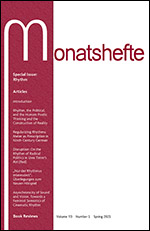|


|

Subscribe
Read the Journal Online
Submission Guidelines
Editorial Board
Receive Email Updates
Advertise in Monatshefte
Indexes/Abstracts
Current Issue TOC
Back Issues TOC
Monatshefte 2022 Subscription Rates
Institutions:
print & online $271
online only $233
Individuals:
print & online $103
online only $86
Non U.S. Postage (no postage charges for online-only subscriptions)
Airmail: add $40/yr.
Canadian Subscribers: add 5% GST. |
Monatshefte
Volume 100, Number 2, Summer 2008 Table of Contents
À Propos
Interview with former President of the Bundestag, Phillipp Jenninger
Articles
Christoph Schmitt-Maaß
Erbrechen oder Einverleiben? Zwischen eigenmotivierter Fremdforschung und Gefährdung des Subjekts: Ethnographie im Spannungsfeld von Wissenschaft, Poesie und Autobiographie
Abstract:
Hubert Fichte is still considered the most important representative of German ethnopoetics. Fichte has been criticized that his research of the other is nothing else but research of the self. However, Fichte himself already anticipated and refuted those polemic attacks in his “New Science of Man” (Neue Wissenschaft vom Menschen). In order to delineate the connection between science, poetics, and autobiography, this article traces Fichte’s use of the two dialectic metaphors of penetration (“Eindringen”) and vomiting (“Erbrechen”). Finally, other options and variants of contemporary German ethnopoetry are thematized (Hans Christoph Buch, Michael Roes). (CMS; in German)
David J. Rosenberg
Patho-Teleology and the Spirit of War: The Psychoanalytic Inheritance of National Psychology
Abstract:
The article provides a historical overview of the proposed discipline of Völkerpsychologie (“national psychology”), which claimed national identity as the defining element of the human psyche. In the incarnations of founders Moritz Lazarus and Heymann Steinthal (1860–1890) and their successor Wilhelm Wundt (1900–1920), Völkerpsychologie adopts the Hegelian conception of Germany as the motivating cultural force of world history. Lazarus’, Steinthal’s, and Wundt’s conceptions of the “national spirit” (Volksgeist) and “national soul” (Volksseele), respectively, prove compatible with an ideology of war centered around German unification and expansion. The article then moves forward to the encounter between Völkerpsychologie and Freudian psychoanalysis in Freud’s Totem and Taboo (1912). Psychoanalysis, in its inheritance of the Völkerpsychologie project, not only provides the tools for a critique of a nationalist ideology of war grounded on the assumption of historical continuity and progress, but also renders the assumption of national identity itself problematic. (DJR)
Klaus Plonien
“Das, was ihm fehlt, das teil’ ich aus”: Faust und die Allegorie der Poesie
Abstract:
Over the last twenty-five years, Faust scholarship transformed significantly as a result of Heinz Schlaffer’s “rediscovery” of the allegorical structure of Faust II. The emphasis on allegory facilitated an interpretation that in contrast to the unifying view of a symbolic reading demonstrated the rift in modern-day experience. According to Schlaffer, through allegorical form, Goethe achieved adequate representation of a rapidly developing and increasingly abstract modern society. This essay attempts to interpret the allegorical structure of Faust II differently than Schlaffer. While Schlaffer equates the use of allegory with Goethe’s regaining of representational assurance in a mimetic sense, the approach employed in this essay emphasizes Goethe’s use of allegorical forms as a poetic means to represent adequately the role of art and literature in modern society. In essence this article addresses the modernization of the system of literature, which was to reach a similar degree of complexity found in other subsystems comprising modern society. A reading of Faust I will elucidate further the different poetological approaches at work in the two parts of Goethe’s opus magnum. (KP; in German)
Michael E. Auer
“Und Eine Freiheit macht uns alle frei!” Das Polyptoton in Schillers Freiheitsdenken
Abstract:
By means of an analysis of the rhetorical figure of the polyptoton (a trope in which a word is repeated in a different grammatical form), this study pursues the understanding of freedom that emerges in Schiller’s aesthetic writings of the 1790s, particularly in Die ästhetische Erziehung des Menschen. Instead of subsuming freedom under one overriding concept, Schiller’s thought is guided by a polyptonic model of autonomy that allows for a plurality of distinct freedoms that are referenced by, but not reducible to, one another. This pluralistic approach to freedom is a unique contribution to the history of thought and distinguishes Schiller not only from Kantian Idealism, but, more importantly, from Hegelian dialectics. In his plays Wallenstein, Maria Stuart, Die Jungfrau von Orléans, Die Braut von Messina, and Wilhelm Tell Schiller radically scrutinizes and problematizes this polyptonic structure of freedom and, thus, increasingly overcomes the antagonism that destroys his heroes and heroines, moving instead towards an admittedly precarious, but also liberating, socially and politically meaningful balance of autonomies. (MEA; in German)
Hartmut Vollmer
“Glück malt man mit Punkten, Unglück mit Strichen.” Peter Stamms Roman Agnes
Abstract:
The first novel Agnes by the Swiss author Peter Stamm, published in 1998, attracted considerable attention. It relates, in an aesthetically subtle manner, a modern love-story which demonstrates the deep conflict between reality and fiction and, at the same time, the power of literature. The love affair between the first-person narrator, a Swiss non-fiction author, who undertakes research into de luxe railway cars in Chicago, and Agnes, a twenty-five-year-old American doctoral student of physics, develops into an aesthetic question concerning the extent to which happiness can be described. The present contribution examines in detail the literary divergence between imagination and reality which becomes evident in the love-story written down by the first-person narrator. It analyzes the reasons for the narrative experience of the failure of happiness. (HV; in German)
Book Reviews
Allemann, Beda, Heinrich von Kleist. Aus dem Nachlaß herausgegeben von Eckart Oehlenschläger. Ein dramaturgisches Modell (Gerhard Sauder)
Bacht, Nikolaus, ed., Music, Theater and Politics in Germany: 1848 to the Third Reich (Pamela Potter)
Block, Richard, The Spell of Italy: Vacation, Magic, and the Attraction of Goethe (Martina Kolb)
Currid, Brian, A National Acoustics: Music and Mass Publicity in Weimar and Nazi Germany (Pamela Potter)
Denham, Scott and Mark McCulloh, eds., W.G. Sebald: History—Memory—Trauma (Lynn Wolff)
Faßler, Manfred, Bildlichkeit. Navigationen durch das Repertoire der Sichtbarkeit (Sabine Gross)
Kittstein, Ulrich, “Mit Geschichte will man etwas”. Historisches Erzählen in der Weimarer Republik und im Exil (1918–1945) (Gregor Streim)
Koch, Lars, Der Erste Weltkrieg als Medium der Gegenmoderne. Zu den Werken von Walter Flex und Ernst Jünger (Jerker Spits)
Leydecker, Karl, German Novelists of the Weimar Republic: Intersections of Literature and Politics (Peter Morris-Keitel)
Löchte, Anne, Das Berliner Journal (1859–1918). Eine deutschsprachige Zeitung in Kanada (Cora Lee Kluge)
Lützeler, Paul Michael, Kontinentalisierung. Das Europa der Schriftsteller (Christian J. Emden)
Murdoch, Brian, The Novels of Erich Maria Remarque: Sparks of Life (Peter Morris-Keitel)
Pethes, Nicholas, Zöglinge der Natur. Der literarische Menschenversuch des 18. Jahrhunderts (Gunhild Berg)
Prager, Brad, Aesthetic Vision and German Romanticism: Writing Images (Monika Schmitz-Emans)
Presner, Todd Samuel, Muscular Judaism: The Jewish Body and the Politics of Regeneration (Sander L. Gilman)
Richter, Simon, Missing the Breast: Gender, Fantasy, and the Body in the German Enlightenment (Robert Tobin)
Saadhoff, Jens, Germanistik in der DDR. Literaturwissenschaft zwischen “gesellschaftlichem Auftrag” und disziplinärer Eigenlogik (Michael Eckardt)
Sachs-Hombach, Klaus, Hrsg., Bildwissenschaft. Disziplinen, Themen, Methoden (Sabine Gross)
Schlösser, Hermann, Kasimir Edschmid. Expressionist—Reisender—Romancier (Christine Spreizer)
Scholz, Oliver R., Bild, Darstellung, Zeichen. Philosophische Theorien bildlicher Darstellung (Sabine Gross)
Shahar, Galili, theatrum judaicum. Denkspiele im deutsch-jüdischen Diskurs der Moderne (Todd Samuel Presner)
Windt, Karin, Beschädigung, Entschädigung—Überlieferung, Auslieferung. Körper, Räume und Geschichte im Werk von Libuše Moníková (Helga G. Braunbeck)
Zeller, Thomas, Driving Germany: The Landscape of the German Autobahn, 1930–1970 (Erhard Schütz)
Books Received
|

